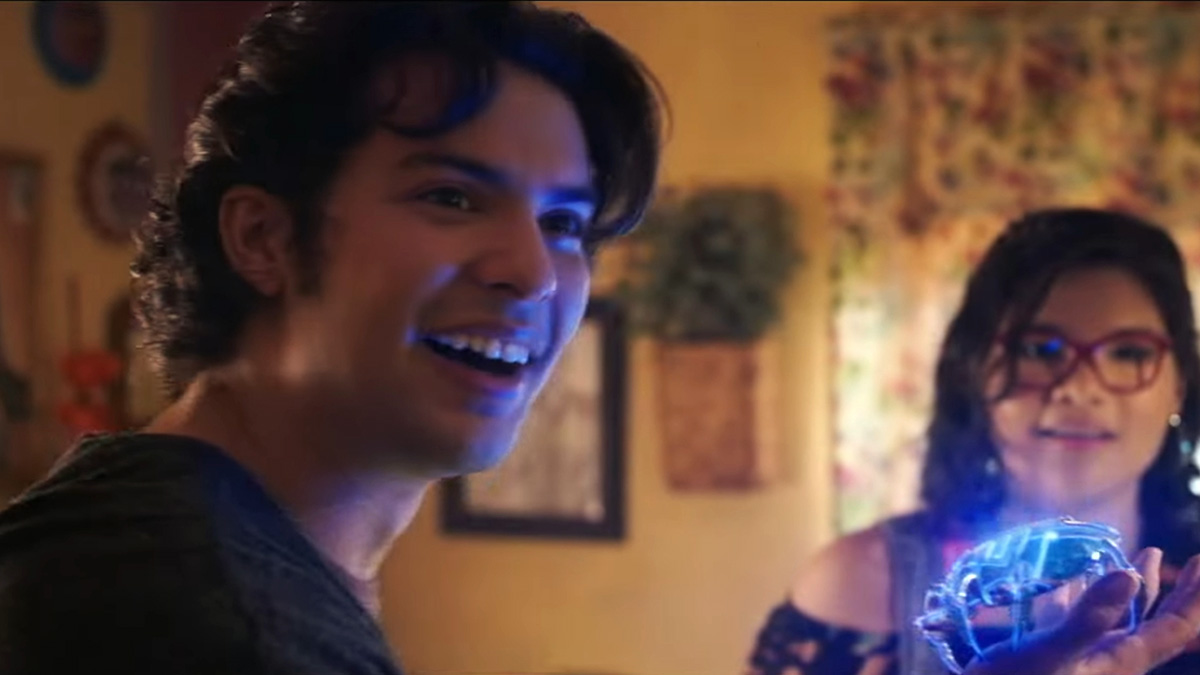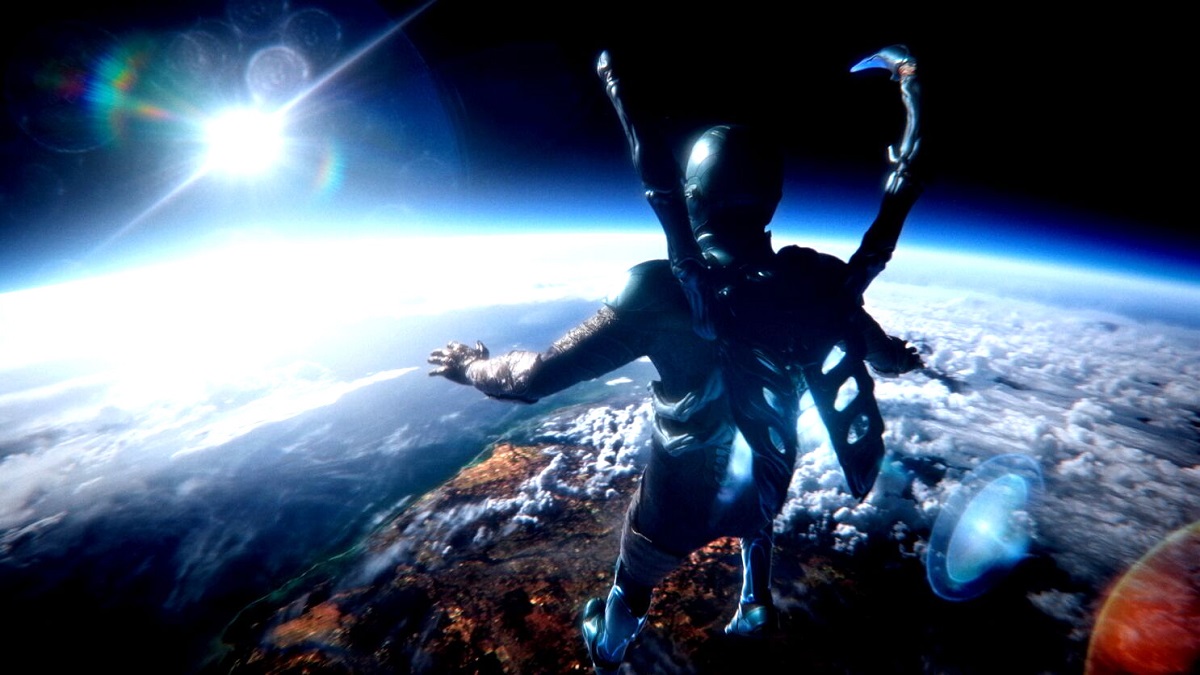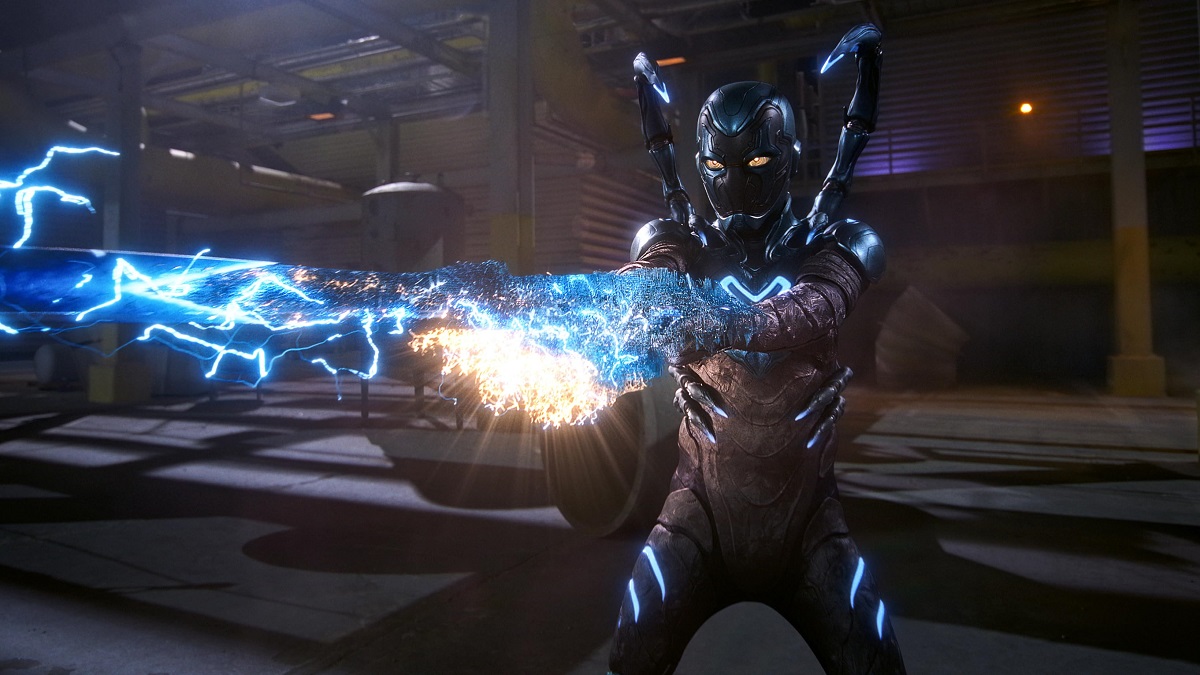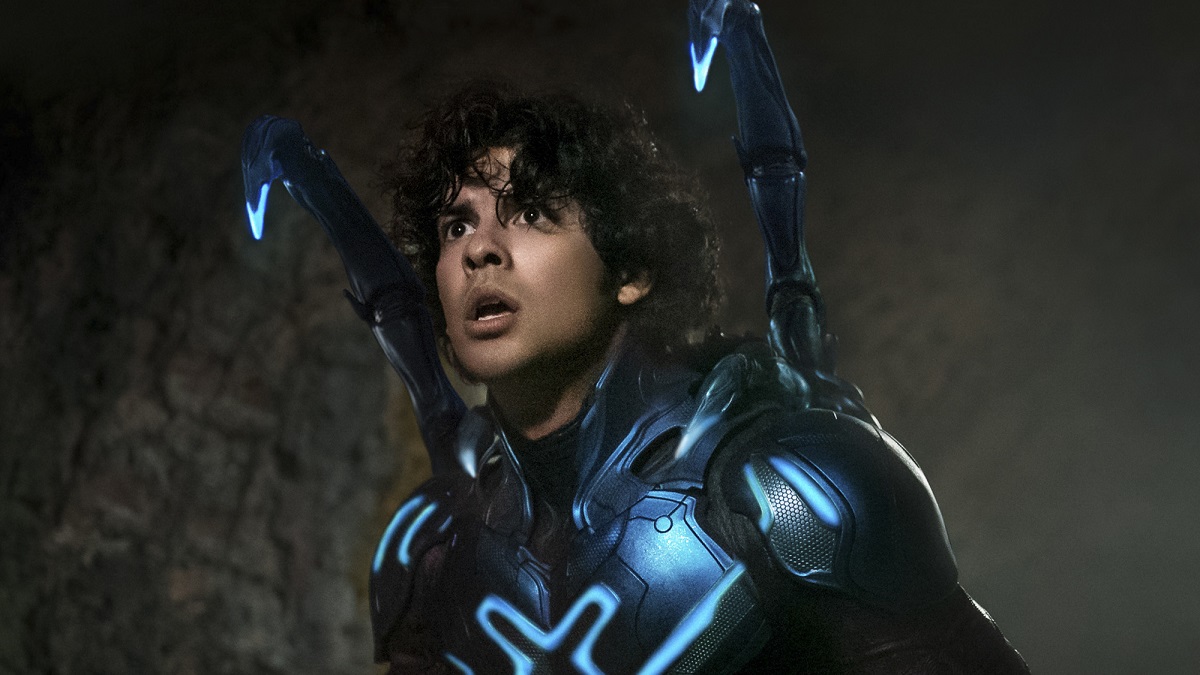Ángel Manuel Soto’s Blue Beetle has had an uphill battle, with the director revealing he had to fight for the film to release in theaters, which has worked out just fine in the end thanks to a a unique superhero offering in a recent sea of bland, formulaic, by-the-books comic book adaptations.
If anything, it’s clear that Blue Beetle is a labor of love. Xolo Maridueña stars as Jaime Reyes, a young, Mexican-American college grad. Upon his return to Palmera City, he discovers his family is struggling financially. Though he wishes to help his family more than anything, he quickly discovers what any recent college grad could tell you; it’s not so easy getting a job even with a diploma these days.

But Jaime doesn’t give up. When a job opportunity with Kord Industries falls into his lap, he takes the chance and comes into contact with an alien armor that molds itself to his body (Soto delights in body horror here). With his family forming an eccentric support team, Jaime becomes the Blue Beetle and discovers his place in the world — and how important his family’s values truly are to him.
Maridueña’s more than up to the task of carrying some of Blue Beetle‘s heavier moments, but his joy at discovering his newfound abilities adds some much-needed levity into the mix. Jaime’s a conflicted, young man with no clue what to do with his life, but that doesn’t mean he can’t have his own fun. It’s a very relatable story at the moment, and Maridueña balances an everyman appeal while not making the character too broadly relatable. He still has his own specific wants, needs, circumstances – the main character in a movie doesn’t necessarily become the most interesting character – but Maridueña manages to do so here.
Damián Alcázar’s performance as Alberto Reyes, Jaime’s father, is also heartfelt and authentic in a way that recalls Cliff Robertson as Sam Raimi’s Uncle Ben. In fact, Blue Beetle is often reminiscent of 2002’s Spider-Man in tone with its splendid mix of humor and drama. When Alcázar and Maridueña share the screen, it’s time to sit up and take notice.

Maridueña’s performance shines even brighter when he shares the screen with his co-stars. Bruna Marquezine, who plays Jenny Kord, shares a palpable romantic tension with Maridueña. Luckily, Jenny is not shoved to the side as in other superhero movies; her arc is complementary to his. Milagro Reyes (Belissa Escobedo) and Rudy Reyes (George Lopez) serve as comedic relief for most of the runtime, but their chemistry with Jaime is genuine, and Escobedo gets a chance to stretch her dramatic acting muscles in one particularly memorable moment. Though Nana (Adriana Barraza) and Rocio Reyes (Elpidia Carrillo) aren’t given as much to do as the other family members, the two get their own spotlight moments as well.
Of course, the movie’s Palmera City setting is nearly a character of its own. Neon and colorful, Soto eschewed a muted color palette for some exciting visuals and battles (be on the lookout for a Dragonball Z reference). Segregated between a warm-toned, Mexican-American neighborhood and a cold, urban sprawl, Soto truly captures the essence of growing up in the city as a Chicano.
Soto has talked extensively about his aims with the movie; he hoped to bring the Latino experience, tragically lacking in representation, to the general audience. In that, he succeeded with flying colors. The Reyes family is a rich and colorful representation of a typical, working-class Mexican-American family. From Jaime’s concerns that he needs to be the one to achieve the American Dream to the family’s closeness to a spirited scene set to “La Chona” and a post-credits scene that requires knowledge of Latin American pop culture to understand — it’s all there.

That being said, the movie does struggle in its climax. There are one-too-many moments where the Reyes family ends up separated in some way, decides to regroup, finds one another, then loses each other again. It also falls into the familiar trap many superhero movies run into: there are a few moments where the movie could end its climactic battle but chooses to continue it anyway, which works for the spectacle, but not so much for the film’s pacing.
Blue Beetle also falls into another familiar trope in the superhero genre through its under-explored villains. Though Susan Sarandon is as charming as she always is, her Victoria Kord is essentially a mustache-twirling villainess. This isn’t a make-it-or-break-it point for her character, however. There are heavy imperialistic undertones to Kord’s character, and she’s essentially a stand-in for American interference and gentrification issues that plague Latin American communities, so her character isn’t meant to be particularly sympathetic or deep.
There’s not quite such an excuse with Carapax (Raoul Max Trujillo), who’s given a sympathetic motivation for his villainous deeds at the very end. There are glimpses of a deeper, conflicted character underneath Carapax’s rough facade, and he’s a character that would be a great foil to Jaime himself. But Soto never quite fully explores this angle, and the final battle with Carapax fulfills the cliche about the villain having similar powers to the hero (see Iron Man, Iron Man 2, Man of Steel, etc.).
Ultimately, Blue Beetle doesn’t feature world-ending stakes. It’s a movie about a Mexican-American family trying to survive, even though life keeps throwing curveballs at them. You need not worry that Jaime Reyes is anything less than a fully-realized character. There’s no giant laser shooting into the sky at the end of Blue Beetle, just a family of superheroes taking down a corporate boss.
Great
The best film DC has put out in a while, 'Blue Beetle' offers fun, heartfelt action and comedy. Xolo Maridueña shines as Jaime Reyes, while director Ángel Manuel Soto succeeds in delivering an ode to Latin American culture in a superhero outfit.

